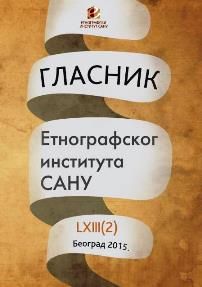Religioznost i spremnost na pomirenje. Antropološki pogled
Religiosity and Readiness for Reconciliation. An Anthropological View
Author(s): Goran Pavel ŠantekSubject(s): Culture and social structure
Published by: Етнографски институт САНУ
Keywords: religion; absoltion; youth; cultural trauma
Summary/Abstract: This paper is an anthropological study of processes that lead to the traumatization of a society, and of processes that result in forgiveness and reconciliation as chosen ways of dealing with post-conflict situations. The area on which the research is focused is Southeastern Europe, or more precisely Croatian and Serbian societies and relations. As cultural anthropology has not developed any special theory to deal with the causes of traumatic experiences in cultures and societies, this study uses the conceptions of closely related cultural sociology, formulated in Jeffrey Alexander's works. According to Alexander cultural trauma occurs when members of a collectivity feel they have been subjected to a horrendous event that leaves indelible marks upon their group consciousness, marking their memories forever and changing their future identity in fundamental and irrevocable ways. Insofar as they identify the cause of trauma, and thereby assume such moral responsibility, members of collectivities define their solidary relationships in ways that allow them to share the sufferings of others. In thinking that the suffering of others might also be our own societies expand the circle of the we. According to the same theory, when social groups refuse to recognize the existence of others' trauma and suffering, they not only diffuse their own responsibility for the suffering but often project the responsibility for their own suffering on these others. It is necessary then, for any process of reconciliation to be successful, that groups recognize suffering of others and their own responsibility. From the fact that social groups might refuse to participate in the process of trauma creation, it is obvious that trauma does not exist naturally, but that trauma is a social construction, a socially mediated attribution. This paper and research are also designed as an anthropological comparison with a huge sociological research of religiosity in Croatia done in 2000, partly also focused on the topic of reconciliation. Anthropological research of young believers for this paper was conducted in 2014 and 2015 in Croatia, with interview used as the main research method. The main results show that: there still exists an important difference between proclaimed and practical believers; both Catholic Church in Croatia and Serbian Orthodox Church are expected to work on forgiveness and reconciliation; ecumenism is highly valued; readiness for taking part in common Catholic-Orthodox meetings and services is ubiquitous; and that the readiness to forgive and conciliate is real and substantial. The research confirmed the vision of youth believers as a group that is especially ready to conciliate and actively work on the processes of reconciliation and forgiveness, and that there is a solid basis for the success of these processes in contemporary Croatian society.
Journal: Гласник Етнографског института САНУ
- Issue Year: LXIII/2015
- Issue No: 2
- Page Range: 265-281
- Page Count: 17
- Language: Croatian

